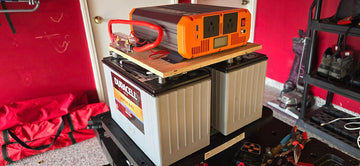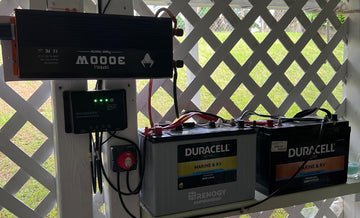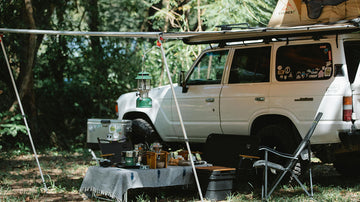An inverter is a key component that converts DC power into AC power for household appliances and is commonly used in solar energy systems or with batteries as a mobile power source. When choosing an inverter, what is the difference between a high-frequency and a low-frequency inverter? Which one should I choose? In this post, we'll explore the key features, points, and applications of high-frequency and low-frequency inverters to help you make an informed decision.
What does "frequency" mean?
The term “frequency” refers to the operating rate of the electronic switches inside the inverter, i.e. the DC-AC conversion rate.
Many people incorrectly believe that “frequency” refers to the frequency of the AC output from the inverter, but the frequency of the AC output is fixed, usually 50Hz or 60Hz.

What are high-frequency inverters?
High-frequency inverters have a much higher internal switching frequency than conventional low-frequency inverters - typically 20 kHz to 100 kHz.
High-frequency inverters use high-frequency switches to convert incoming low-voltage DC power to high-frequency low-voltage AC power. This is followed by a high-frequency transformer to step up the voltage, followed by a filter to rectify the voltage to high-voltage DC, and finally, the output is processed by an inverter circuit to produce standard AC (50 Hz or 60 Hz).
Advantages of high-frequency inverter
- Smaller size and lighter weight: High-frequency inverters have the core advantage of using smaller and lighter internal electronic components and transformers.
- High efficiency: The core material used in high-frequency inverters increases the power density of the circuit, resulting in less energy loss during high-frequency switching. This greatly improves the efficiency of the inverter, especially at low or medium loads.
- Lower cost: Since high-frequency inverters use modern semiconductor components such as MOSFETs or IGBTs, their manufacturing cost is lower compared to low-frequency inverters.
- Less noise: High-frequency inverters do not have the large transformers found in traditional low-frequency inverters and therefore operate almost noiselessly
Disadvantages of high-frequency inverter
- Weak shock resistance: High-frequency inverters have difficulty with high starting currents or transient overloads. High-frequency inverters are usually designed for small to medium power loads and are difficult to support the operation of high-power equipment for long periods.
- Poor heat dissipation: Typically, under high load or high voltage conditions, high-frequency inverters do not dissipate heat as well as low-frequency inverters. High-frequency inverters are less tolerant of voltage fluctuations, temperature changes, and other factors.
- Sensitive to load type: High-frequency inverters may output corrected sine or square waveforms, which may not be suitable for some appliances with high waveform requirements.
What are low-frequency inverters?
Low-frequency inverters convert DC power directly to medium frequency, low voltage AC power in the traditional manner, which is then boosted by an IF transformer to 220V, 50Hz AC for use by the load. Unlike high-frequency inverters, there is no need to rely on high-speed electronic switching. It is called "low frequency" because the internal transformer operates at the standard 50Hz or 60Hz frequency, the same frequency used in the power grid.
Advantages of low-frequency inverter
- High shock resistance: Low-frequency drives can withstand high starting currents and transient overloads.
- High durability: The AC drive uses a heavy-duty transformer and rugged components for extreme durability and reliability. It can maintain stable operation even in harsh environments or under high-voltage load conditions.
- Good heat dissipation: Low-frequency inverters generate a lot of heat under high loads or high-temperature environments, so their heat dissipation design is usually better.
- Excellent inductive load support: Most low-frequency inverters can output a pure sine wave with the same waveform as the grid, which is good for inductive loads. This waveform is suitable for all types of electrical equipment.
- Long life: Because low-frequency inverters use heavy-duty components, they have a relatively low failure rate and low maintenance costs. Typically, low-frequency inverters have a long service life.
- Insensitivity to Input Voltage Fluctuations: Low-frequency inverters are more tolerant of input voltage fluctuations and can operate stably over a wide range of input voltages, making them suitable for systems with large battery voltage fluctuations (such as solar power systems).
Disadvantages of low-frequency inverter
- Larger and heavier: Compared to high-frequency inverters, low-frequency inverters have larger transformers and internal components, resulting in larger size and weight.
- Higher cost: Due to the higher cost of heavy transformers and large components, AC drives are more expensive on the market.
- Noisy: The large transformers in low-frequency inverters can produce a noticeable hum during operation, especially under high load conditions.
- Low efficiency: The internal structure of a low-frequency inverter causes more heat to be wasted during power generation, and its efficiency will be lower than that of a high-frequency inverter. There will be energy loss even at no load.
Key differences between high and low-frequency inverters
High-frequency inverters and low-frequency inverters are two common types of inverters. They have significant differences in their operation and characteristics, and the following table is a detailed comparison of them.
| High-frequency inverters | Low-frequency inverters | |
| Operating Frequency | 20kHz-100kHz | 50Hz or 60Hz |
| Size and Weight | Small, light | Large, heavy |
| Efficiency | High (up to 90%) | Lower (typically 85%) |
| Cost | Higher | Lower |
| Noise | Low noise from high-frequency switching | Transformer operation is noisy |
| Shock Resistance | Weaker, difficult to withstand large inrush current | Stronger, can withstand large starting current |
| Durability | Poor | Better |
| Support Inductive Loads | Unfavorable | Favorable |
| Lifetime | Shorter | Longer |
| To Voltage Fluctuations | Low tolerance | High tolerance |
High vs. low frequency inverters: Which one should you choose?
Both high-frequency and low-frequency inverters have their advantages and disadvantages. When selecting an inverter, a comprehensive consideration should be made based on specific needs and application scenarios. The following is a summary of the common aspects of both inverters:
Real-world application of high-frequency inverters
1️⃣Portable Power Systems
Smaller in size and weight, high-frequency inverters are especially suited for scenarios where space is limited or portability is required, such as RVs, boats, camping, etc.
2️⃣Small and Medium Solar Systems
The use of high-frequency switching technology greatly improves the efficiency of high-frequency inverters, and their peak conversion efficiency can reach more than 90% in small and medium-sized solar systems. However, it is difficult for high-frequency inverters to support high-power devices for a long time. If high-power devices are driven for a long time, the high-frequency inverter may be overloaded or overheated, resulting in damage.
3️⃣Low power load
High-frequency inverters perform well under low-load conditions. For scenarios with small loads and high-efficiency requirements, a high-frequency inverter can undoubtedly be selected. For example, laptop computers, LED low-loadlights, small home appliances, etc.
4️⃣Quiet occasions
High-frequency inverters run almost silently and are suitable for situations that require low-noise operation, such as study rooms, offices, or medical equipment.
5️⃣Projects with limited budgets
The low cost of high-frequency inverters makes them suitable for those who have a limited budget but need a basic power conversion function.
Real-world application of low-frequency inverters
1️⃣High power loads
Motorized equipment typically requires 3-5 times the rated power current to start, and low-frequency drives can handle high inrush currents. This makes them ideal for powering equipment with high startup requirements such as air conditioners, furnaces, water pumps, etc.
2️⃣Off-grid power systems (large scale)
Low-frequency inverters have a lower failure rate and lower maintenance costs. It is suitable for homes or huts that rely on off-grid solar systems for power supply or backup power systems, especially in scenarios where the load is large and needs to be stabilized over a long period.
3️⃣Inductive loads
Low-frequency inverters are ideal for driving inductive loads (e.g. power tools, water pumps, compressors, etc.) that generate large reverse electromotive forces during start-up and operation that can be effectively handled by low-frequency inverters.
4️⃣Industrial applications
For example, factory equipment, heavy machinery, agricultural machinery, etc., where high durability and reliability are required.
5️⃣Harsh environments
Low-frequency inverters use heavy-duty transformers and rugged components for high durability and reliability. Even in harsh environments or under heavy load conditions, low frequency inverters operate stably and have a long service life.
At present, the market share of high-frequency inverters continues to grow, and high-frequency inverters are becoming more powerful in terms of heat dissipation and shock resistance. Our 2000W pure sine wave inverter ensures stable operation under heavy load conditions and longer service life through optimized heat dissipation design and high-quality materials.

If you need an efficient inverter for small to medium-power applications, don't miss out!
FAQ
Q: Is a low frequency the same as a modified sinewave?
A: No, a low frequency inverter and a modified sine wave are not the same concept. A pure sine wave is an AC waveform produced by an inverter that is similar to the grid. A low frequency inverter is a classification of inverters that can produce a pure sine wave or a modified sine wave.
Q: Which is better, a high-frequency or a low-frequency inverter?
A: It depends on the user's specific needs and application scenarios. Both inverters have their advantages and disadvantages.
Q: What is the life expectancy of a high-frequency inverter?
A: The service life of high-frequency inverters is about ten years, and the specific situation will vary greatly according to the quality, usage habits, and environment.













